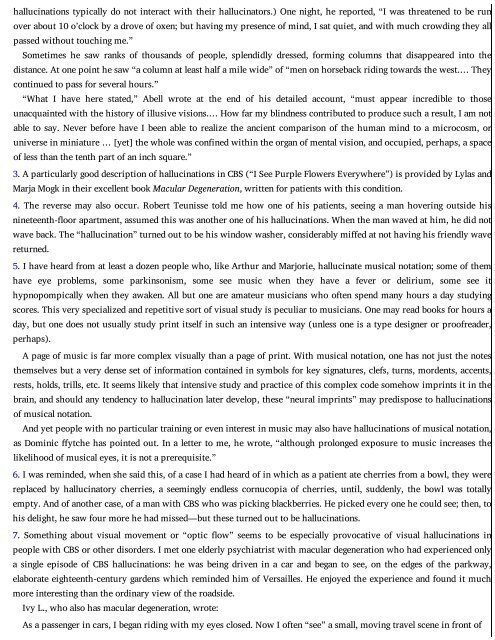32896589326509350
Create successful ePaper yourself
Turn your PDF publications into a flip-book with our unique Google optimized e-Paper software.
hallucinations typically do not interact with their hallucinators.) One night, he reported, “I was threatened to be run<br />
over about 10 o’clock by a drove of oxen; but having my presence of mind, I sat quiet, and with much crowding they all<br />
passed without touching me.”<br />
Sometimes he saw ranks of thousands of people, splendidly dressed, forming columns that disappeared into the<br />
distance. At one point he saw “a column at least half a mile wide” of “men on horseback riding towards the west.… They<br />
continued to pass for several hours.”<br />
“What I have here stated,” Abell wrote at the end of his detailed account, “must appear incredible to those<br />
unacquainted with the history of illusive visions.… How far my blindness contributed to produce such a result, I am not<br />
able to say. Never before have I been able to realize the ancient comparison of the human mind to a microcosm, or<br />
universe in miniature … [yet] the whole was confined within the organ of mental vision, and occupied, perhaps, a space<br />
of less than the tenth part of an inch square.”<br />
3. A particularly good description of hallucinations in CBS (“I See Purple Flowers Everywhere”) is provided by Lylas and<br />
Marja Mogk in their excellent book Macular Degeneration, written for patients with this condition.<br />
4. The reverse may also occur. Robert Teunisse told me how one of his patients, seeing a man hovering outside his<br />
nineteenth-oor apartment, assumed this was another one of his hallucinations. When the man waved at him, he did not<br />
wave back. The “hallucination” turned out to be his window washer, considerably miffed at not having his friendly wave<br />
returned.<br />
5. I have heard from at least a dozen people who, like Arthur and Marjorie, hallucinate musical notation; some of them<br />
have eye problems, some parkinsonism, some see music when they have a fever or delirium, some see it<br />
hypnopompically when they awaken. All but one are amateur musicians who often spend many hours a day studying<br />
scores. This very specialized and repetitive sort of visual study is peculiar to musicians. One may read books for hours a<br />
day, but one does not usually study print itself in such an intensive way (unless one is a type designer or proofreader,<br />
perhaps).<br />
A page of music is far more complex visually than a page of print. With musical notation, one has not just the notes<br />
themselves but a very dense set of information contained in symbols for key signatures, clefs, turns, mordents, accents,<br />
rests, holds, trills, etc. It seems likely that intensive study and practice of this complex code somehow imprints it in the<br />
brain, and should any tendency to hallucination later develop, these “neural imprints” may predispose to hallucinations<br />
of musical notation.<br />
And yet people with no particular training or even interest in music may also have hallucinations of musical notation,<br />
as Dominic ytche has pointed out. In a letter to me, he wrote, “although prolonged exposure to music increases the<br />
likelihood of musical eyes, it is not a prerequisite.”<br />
6. I was reminded, when she said this, of a case I had heard of in which as a patient ate cherries from a bowl, they were<br />
replaced by hallucinatory cherries, a seemingly endless cornucopia of cherries, until, suddenly, the bowl was totally<br />
empty. And of another case, of a man with CBS who was picking blackberries. He picked every one he could see; then, to<br />
his delight, he saw four more he had missed—but these turned out to be hallucinations.<br />
7. Something about visual movement or “optic ow” seems to be especially provocative of visual hallucinations in<br />
people with CBS or other disorders. I met one elderly psychiatrist with macular degeneration who had experienced only<br />
a single episode of CBS hallucinations: he was being driven in a car and began to see, on the edges of the parkway,<br />
elaborate eighteenth-century gardens which reminded him of Versailles. He enjoyed the experience and found it much<br />
more interesting than the ordinary view of the roadside.<br />
Ivy L., who also has macular degeneration, wrote:<br />
As a passenger in cars, I began riding with my eyes closed. Now I often “see” a small, moving travel scene in front of

















